Rheumatologists And MECFS… Why They Get It So Wrong

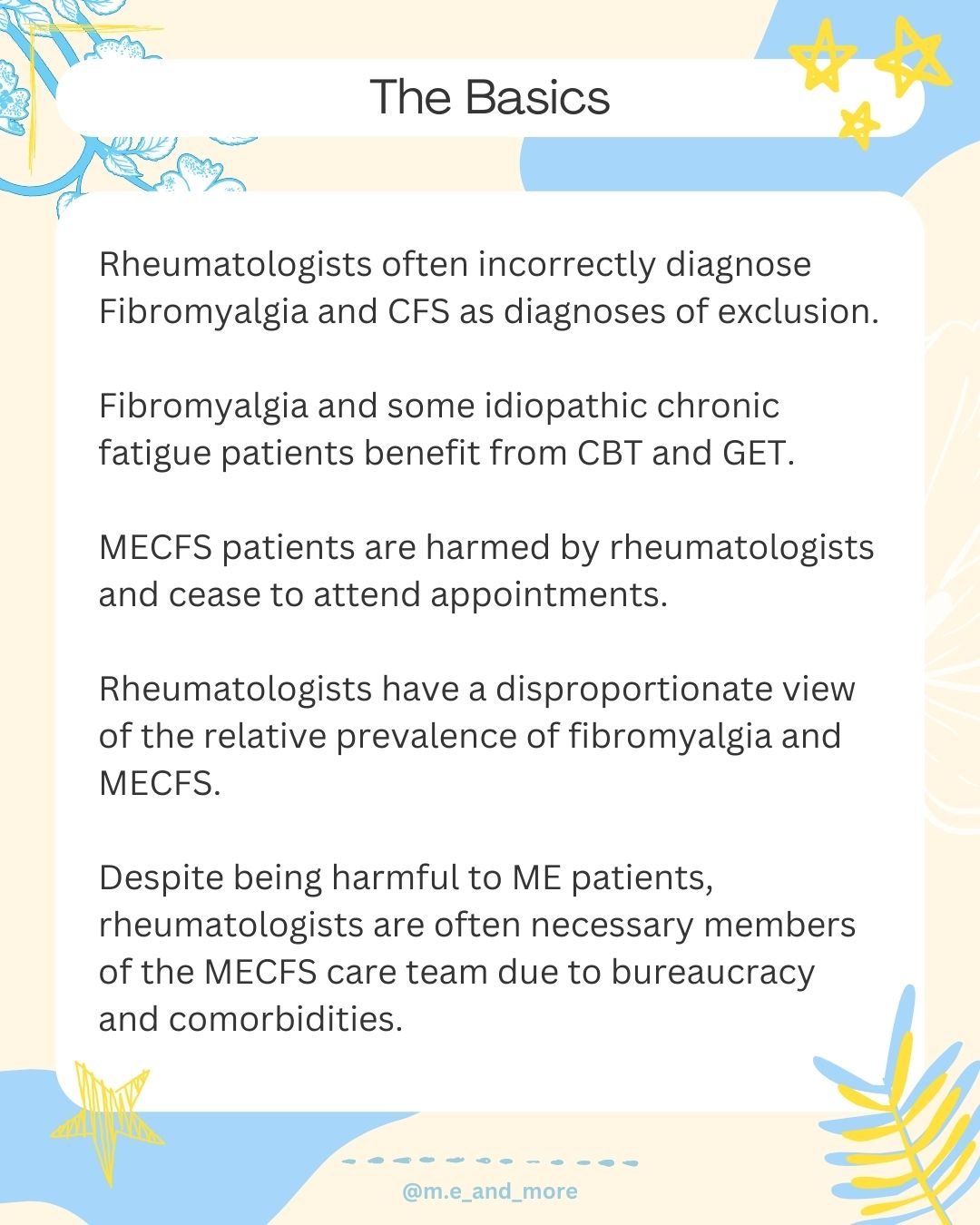
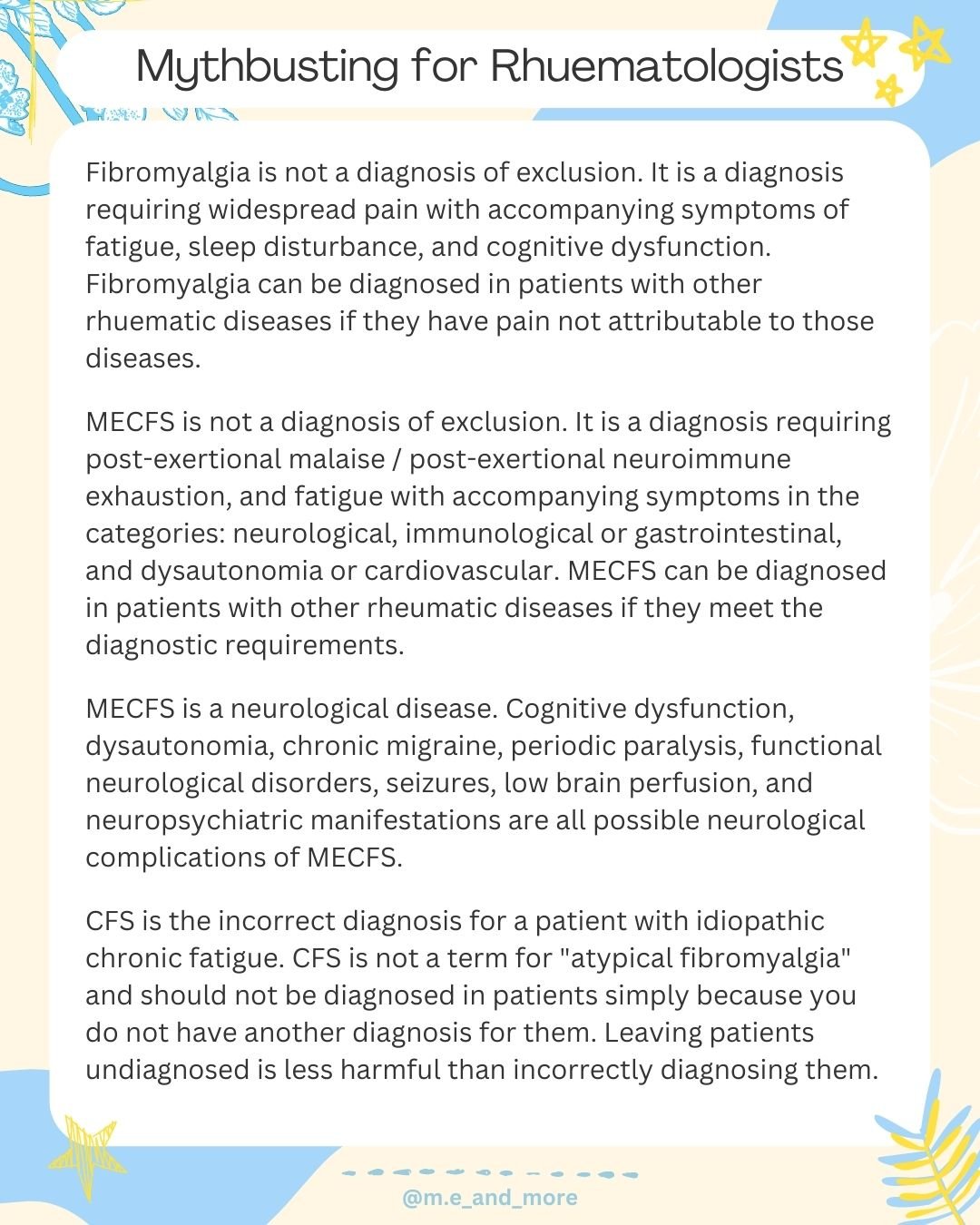
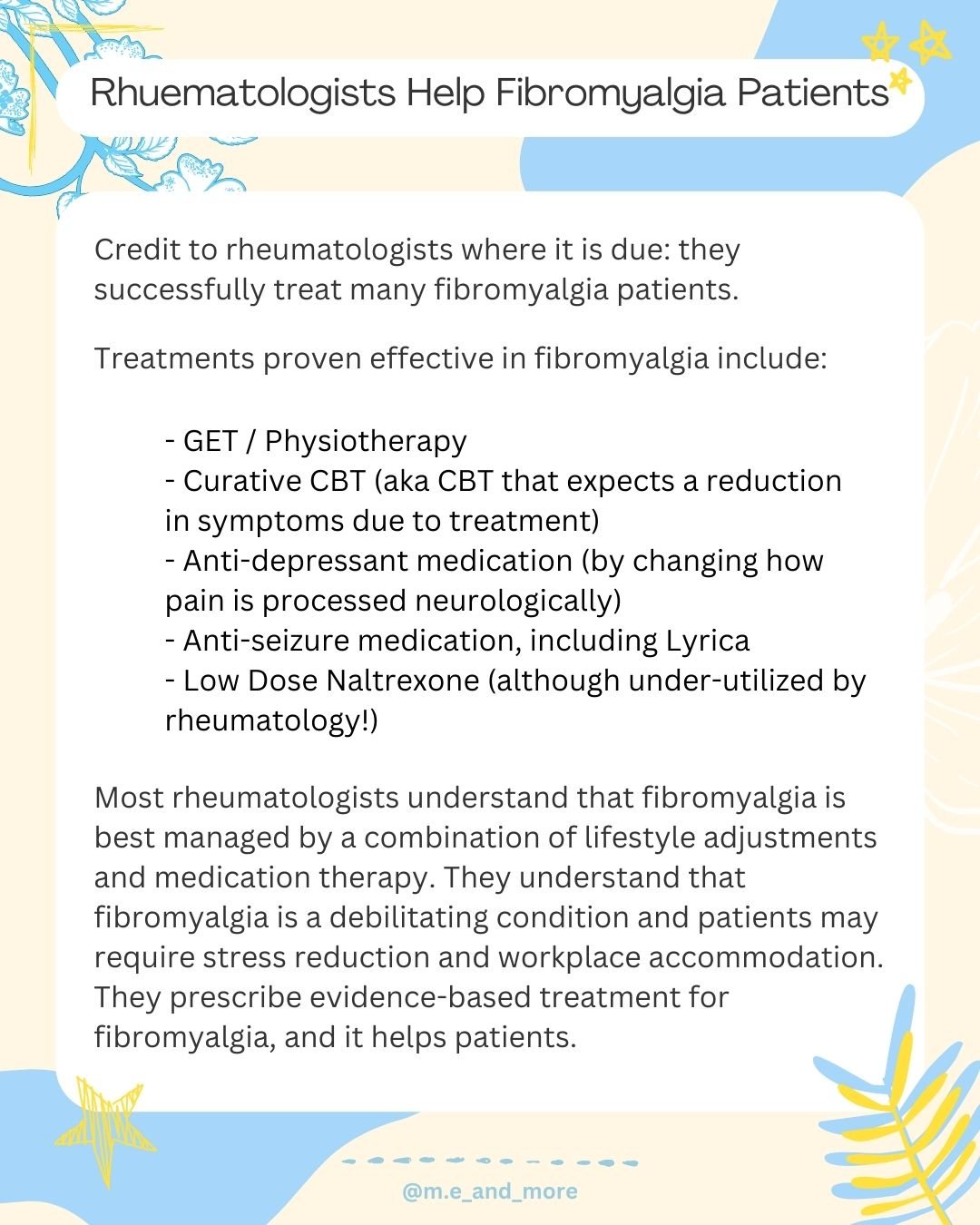
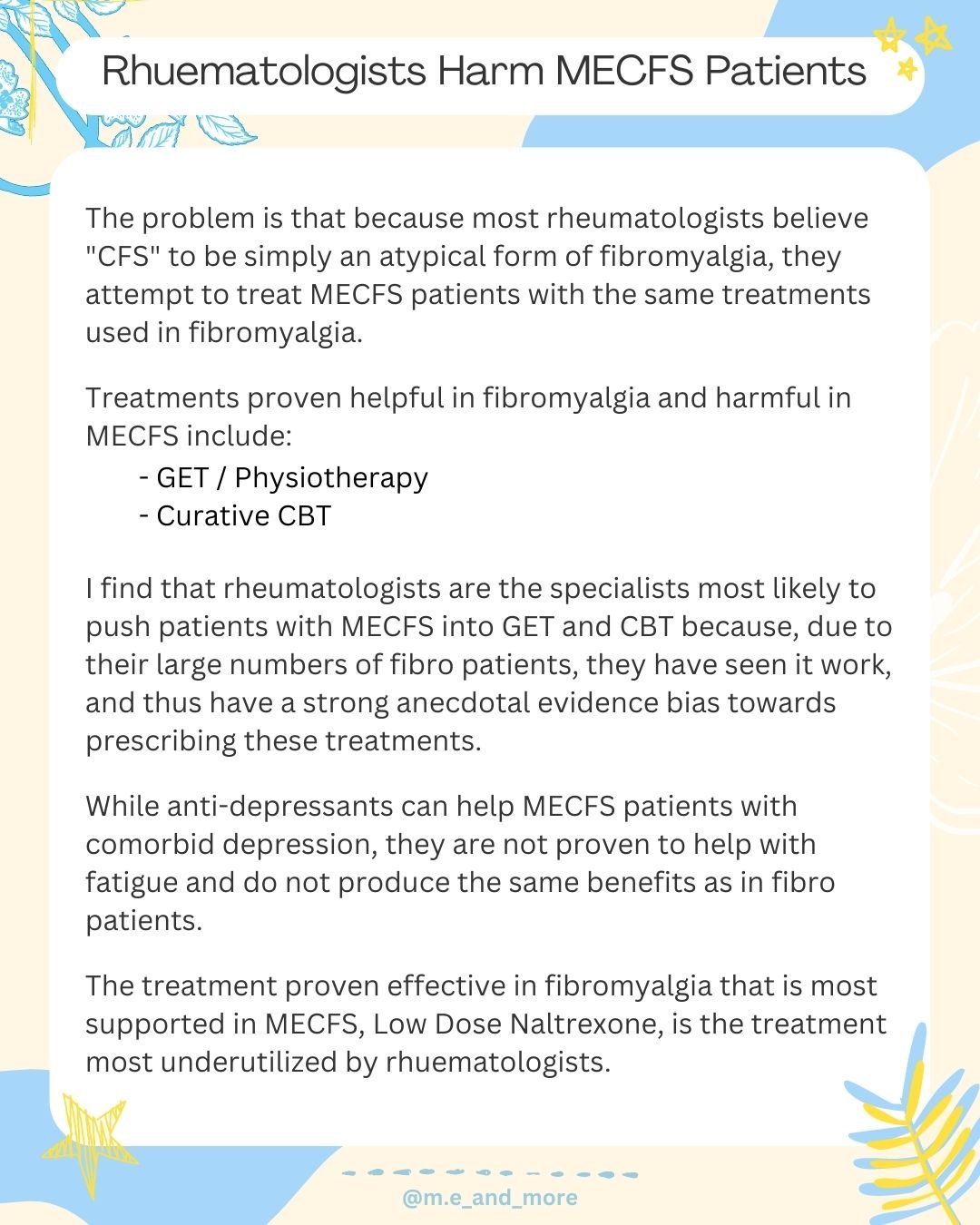
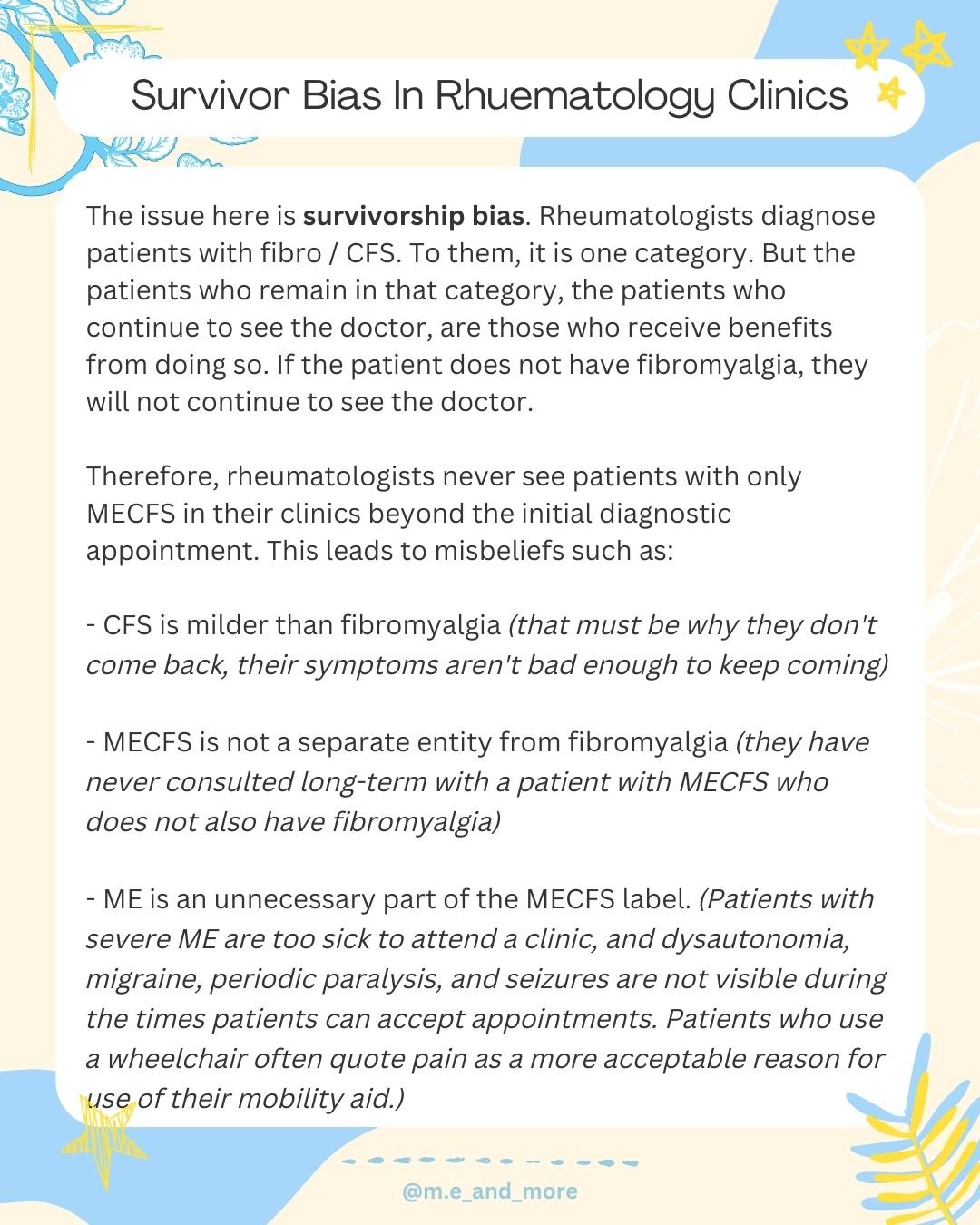
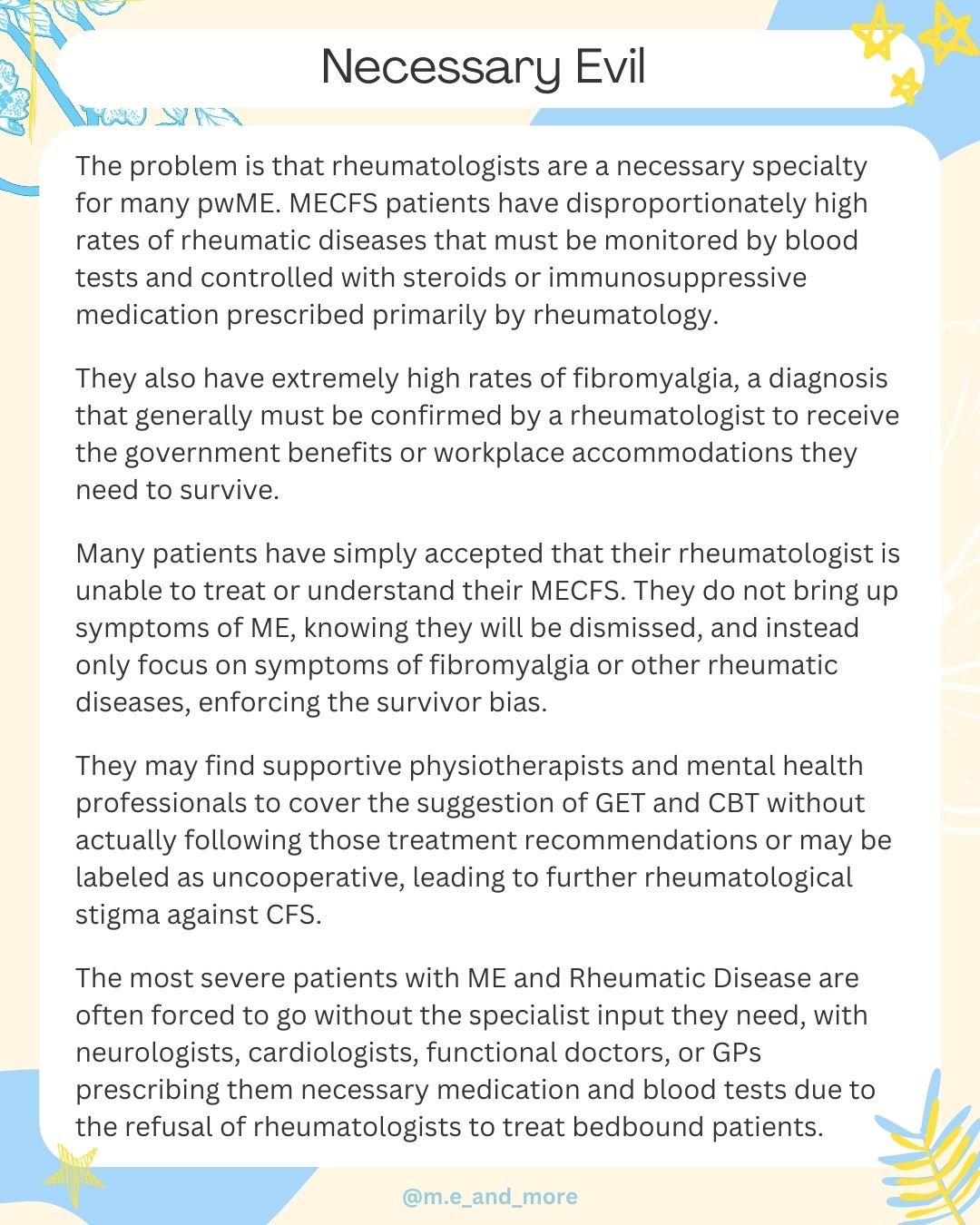
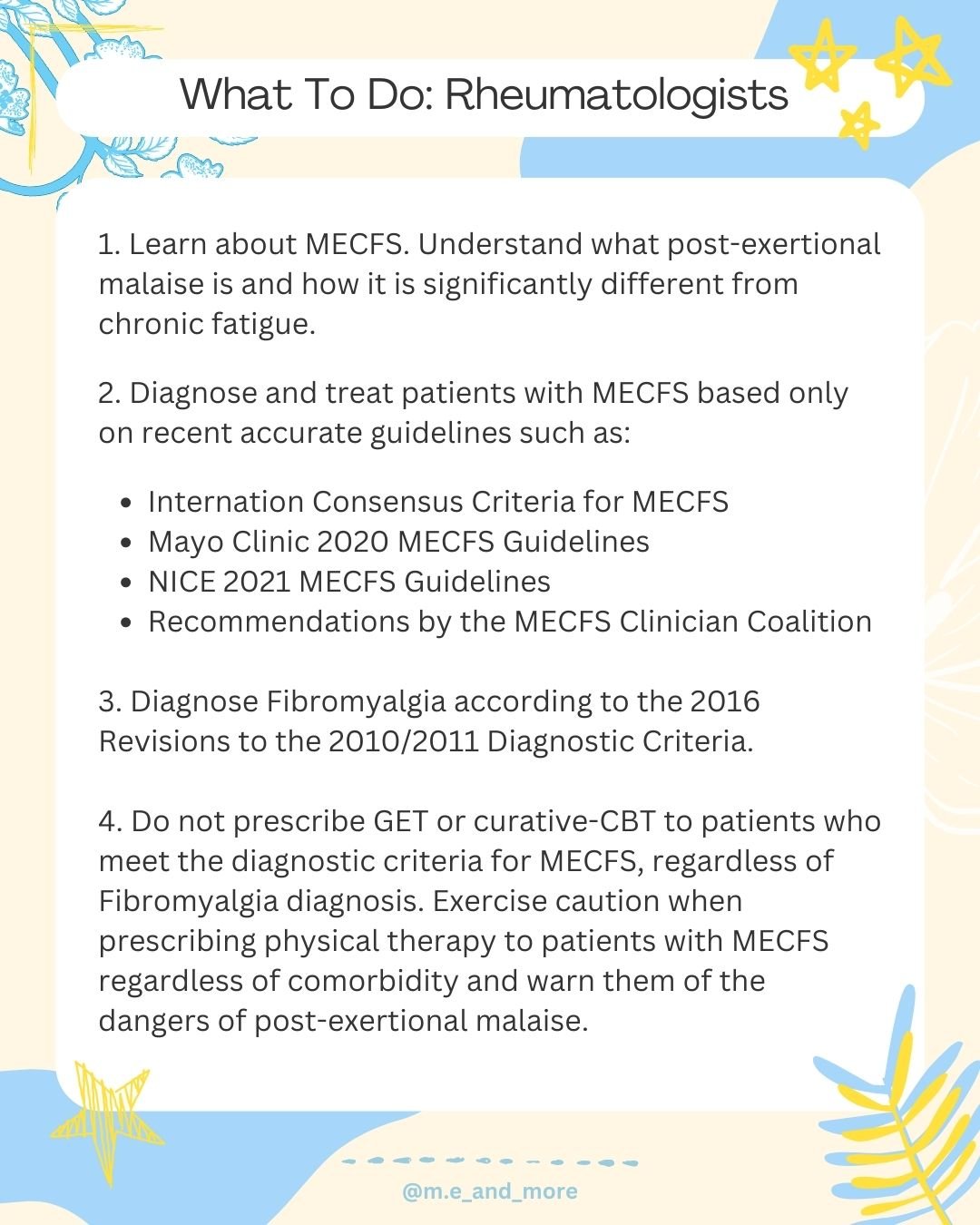
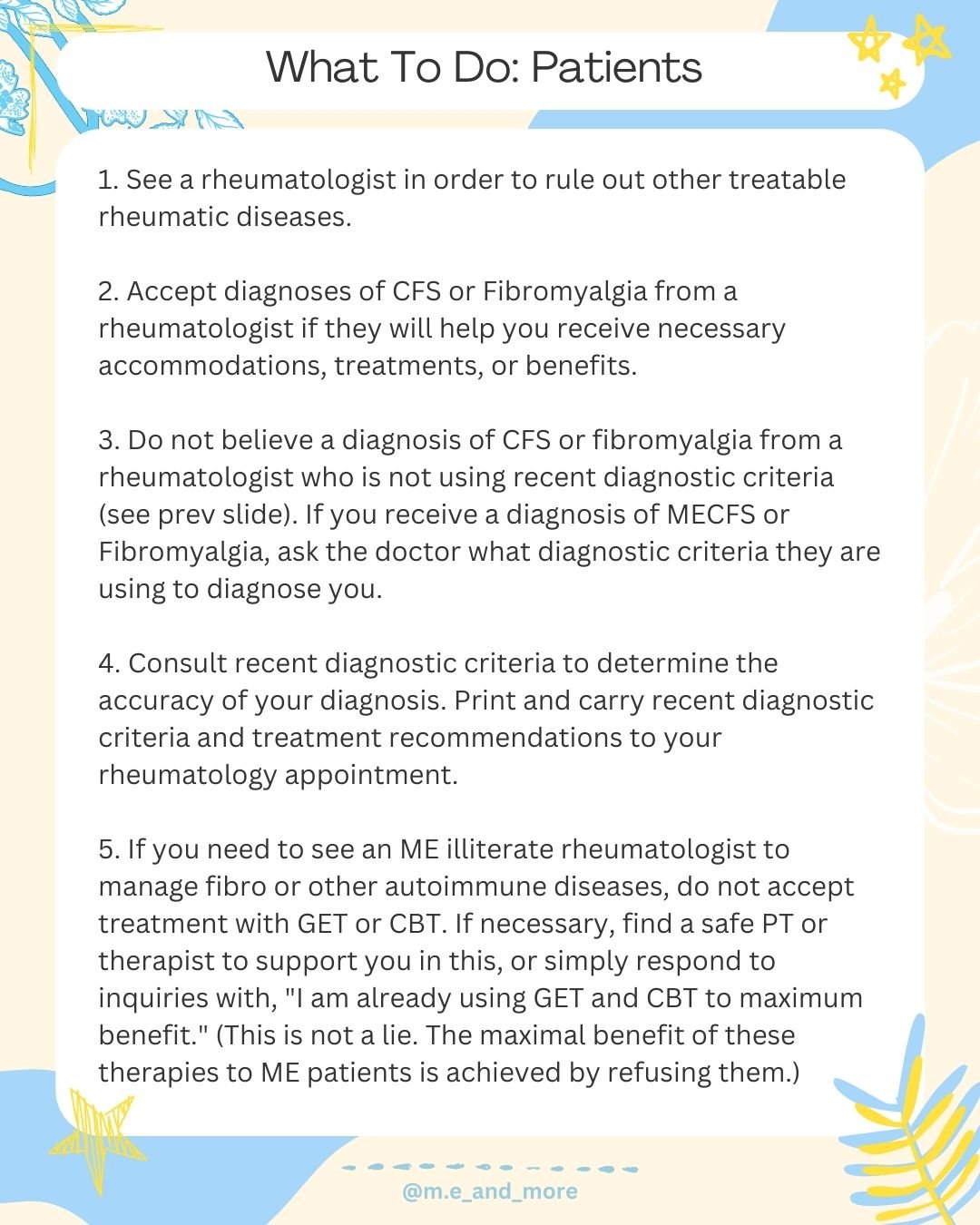
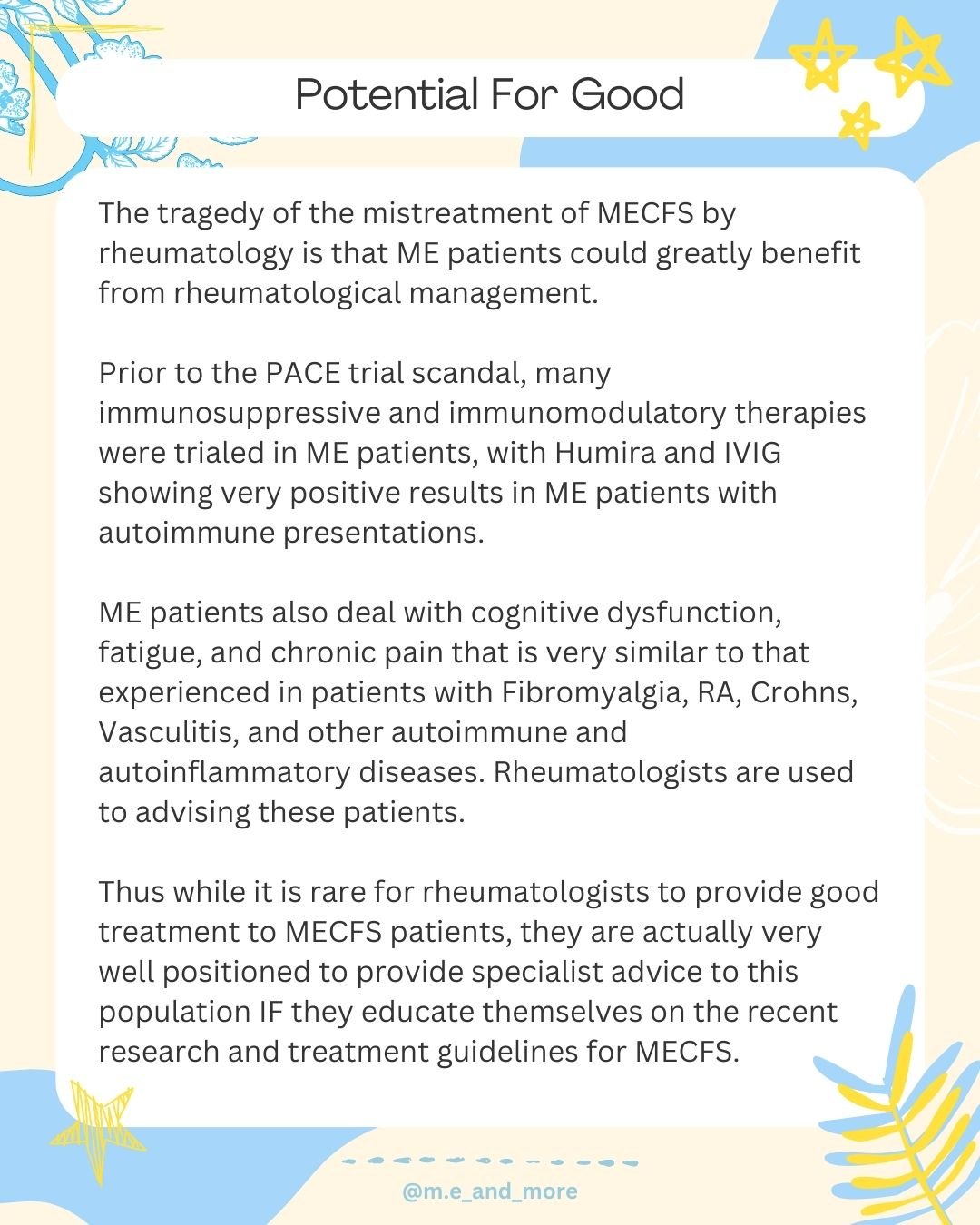
The basics
Rheumatologists often incorrectly diagnose Fibromyalgia and CFS as diagnoses of exclusion
Fibromyalgia and some idiopathic chronic fatigue patients benefit from CBT and GET
MECFS patients are harmed by rheumatologists and cease to attend appointments
Rheumatologists have a disproportionate view of the relative prevalence of fibromyalgia and MECFS
Despite being harmful to ME patients, rheumatologists are often necessary members of the MECFS care team due to bureaucracy and comorbidities
----
Mythbusting for Rheumatologists
Fibromyalgia is not a diagnosis of exclusion. It is diagnosis requiring widespread pain with accompanying symptoms of, fatigue, sleep disturbance and cognitive dysfunction. Fibromyalgia can be diagnosed in patients with other rheumatic diseases if they have pain not attributable to those diseases.
MECFS is not a diagnosis of exclusion. It is a diagnosis requiring post-exertional malaise/post-exertional neuroimmune exhaustion, fatigue with accompanying symptoms in the categories: neurological, immunological or gastrointestinal, and dysautonomia or cardiovascular. MECFS can be diagnosed in patients with other rheumatic diseases if they meet the diagnostic requirements.
MECFS is a neurological disease. Cognitive dysfunction, dysautonomia, chronic migraine, periodic paralysis, functional neurological disorders, seizures, low brain perfusion, and neuropsychiatric manifestations are all possible neurological complications of MECFS.
CFS is the incorrect diagnosis for a patient with idiopathic chronic fatigue. CFS is not a term for "atypical fibromyalgia" and should not be diagnosed in patients simply because you do not have another diagnosis for them. Leaving patients undiagnosed is less harmful than incorrectly diagnosing them.
----
Rheumatologists Help Fibromyalgia Patients
Credit to rheumatologists where it is due. They successfully treat many fibromyalgia patients. Treatments proven effective in fibromyalgia include:
GET / Physiotherapy
Curative CBT (aka CBT that expects reduction in symptoms due to treatment)
Anti-depressant Medication (by changing how pain is processed neurologically)
Anti-seizure Medication including Lyrica
Low Dose Naltrexone (although under-utilized by rheumatology!)
Most rheumatologists understand that fibromyalgia is best managed by a combination of lifestyle adjustments and medication therapy. They understand that fibromyalgia is a debilitating condition and patients may require stress reduction and workplace accommodation. They prescribe evidence-based treatment for fibromyalgia and it helps patients.
----
Rheumatologists Harm MECFS Patients
The problem is that because most rheumatologists believe "CFS" to be simply an atypical form of fibromyalgia they attempt to treat MECFS patients with the same treatments used in fibromyalgia.
Treatments have proven helpful in fibromyalgia and harmful in MECFS include:
GET & Physiotherapy
Curative CBT (aka CBT that expects improvement in symptoms due to treatment)
I find that rheumatologists are the specialists most likely to push patients with MECFS into GET and CBT because due to their large numbers of fibro patients they have seen it work and thus have a strong anecdotal evidence bias towards prescribing these treatments.
While anti-depressants can help MECFS patients with comorbid depression, they are not proven to help with fatigue and do not produce the same benefits as in fibro patients.
The treatment proven effective in fibromyalgia that is most supported in MECFS, Low Dose Naltrexone, is the treatment most underutilized by rheumatologists.
----
Survivor Bias In Rheumatology Clinics
The issue here is survivorship bias. Rheumatologists diagnose patients with fibro / CFS. To them, it is one category. But the patients who remain in that category, the patients who continue to see the doctor, are those who receive benefits from doing so. If the patient does not have fibromyalgia they will not continue to see the doctor.
Therefore, rheumatologists never see patients with only MECFS in their clinics beyond the initial diagnostic appointment. This leads to misbeliefs such as:
CFS is milder than fibromyalgia (that must be why they don't come back, their symptoms aren't bad enough to keep coming)
MECFS is not a separate entity from fibromyalgia (they have never consulted long-term with a patient with MECFS who does not also have fibromyalgia)
ME is an unnecessary part of the MECFS label. (Patients with severe ME are too sick to attend clinic and dysautonomia, migraine, periodic paralysis, and seizures are not visible during times patients can accept appointments. Patients who use a wheelchair often quote pain as a more acceptable reason for use of their mobility aid.)
-----
Necessary Evil
The problem is that rheumatologists are a necessary specialty for many pwME. MECFS patients have disproportionately high rates of rheumatic diseases that must be monitored on blood tests and controlled with steroids or immunosuppressive medication prescribed primarily by rheumatology.
They also have extremely high rates of fibromyalgia, a diagnosis that generally must be confirmed by a rheumatologist to receive the government benefits or workplace accommodations they need to survive.
Many patients have simply accepted that their rheumatologist is unable to treat or understand their MECFS. They do not bring up symptoms of ME knowing they will be dismissed and instead only focus on symptoms of fibromyalgia or other rheumatic diseases, enforcing the survivor bias.
They may find supportive physiotherapists and mental health professionals to cover the suggestion of GET and CBT without actually following those treatment recommendations or may be labeled as uncooperative leading to further rheumatological stigma against CFS.
The most severe patients with ME and Rheumatic Disease are often forced to go without the specialist input they need. With neurologists, cardiologists, functional doctors, or GPs prescribing them necessary medication and blood tests due to the refusal of rheumatologists to treat bedbound patients.
-----
What To Do: Rheumatologists
Learn about MECFS. Understand what post-exertional malaise is and how it is significantly different from chronic fatigue.
Diagnose and treat patients with MECFS based only on recent accurate guidelines such as:
Internation Consensus Criteria for MECFS
Mayo Clinic 2020 MECFS Guidelines
NICE 2021 MECFS Guidelines
Recommendations by the MECFS Clinician Coalition
Diagnose Fibromyalgia according to the 2016 Revisions to the 2010/2011 Diagnostic Criteria
Do not prescribe GET or curative-CBT to patients who meet the diagnostic criteria for MECFS regardless of Fibromyalgia diagnosis. Exercise caution when prescribing physical therapy to patients with MECFS regardless of comorbidity and warn them of the dangers of post-exertional malaise.
-----
What To Do: Patients
See a rheumatologist to rule out other treatable rheumatic diseases.
Accept diagnoses of CFS or Fibromyalgia from a rheumatologist if they will help you receive necessary accommodation, treatment, or benefits.
Do not believe a diagnosis of CFS or fibromyalgia from a rheumatologist who is not using recent diagnostic criteria (see prev slide). If you receive a diagnosis of MECFS or Fibromyalgia ask the doctor what diagnostic criteria they are using to diagnose you.
Consult recent diagnostic criteria to determine the accuracy of your diagnosis. Print and carry recent diagnostic criteria and treatment recommendations to your rheumatology appointment.
If you need to see an ME illiterate rheumatologist to manage fibro or other autoimmune diseases, do not accept treatment with GET or CBT. If necessary find a safe PT or therapist to support you in this, or simply respond to inquiries with "I am already using GET and CBT to maximum benefit." (This is not a lie. The maximal benefit of these therapies to ME patients is achieved by refusing them.)
-----
Potential For Good
The tragedy of the mistreatment of MECFS by rheumatology is that ME patients could greatly benefit from rheumatological management.
Prior to the PACE trial scandal, many immunosuppressive and immunomodulatory therapies were trialed in ME patients with Humira and IVIG showing very positive results in ME patients with autoimmune presentations.
ME patients also deal with cognitive dysfunction, fatigue, and chronic pain that is very similar to that experienced in patients with Fibromyalgia, RA, Crohns, Vasculitis and other autoimmune and autoinflammatory diseases. Rheumatologists are used to advising these patients.
Thus while it is rare for rheumatologists to provide good treatment to MECFS patients, they are actually very well positioned to provide specialist advice to this population IF they educate themselves on the recent research and treatment guidelines for MECFS.
----
Rheumatologists need to learn the difference between Myalgic Encephalomyelitis aka MECFS and Fibromyalgia. Chronic Fatigue Syndrome CFS is not "atypical fibromyalgia" nor should it be used as a wastebasket Diagnosis to get rid of patients with idiopathic Chronic Fatigue
In my last post, I discussed the important distinction between MECFS Myalgic E and fibromyalgia. As recent guidelines clearly state neither of these illnesses are diagnoses of exclusion patients can and do have both comorbidity or in combination with other rheumatological Disease, autoimmune Disease and autoinflammatory Disease.
There is no specialty where understanding the difference between ME and Fibro is more essential than rheumatology. If you are a rheumatologist I urge you, please update your knowledge about these conditions using the sources listed.
Because the truth is that autoimmune and autoinflammatory disease like MS RA vasculitis arthritis and more is very common in combination with ME and fibro. Rheumatologists have vast numbers of patients who are neglecting to confide in them a huge aspect of their illness because they feel that their fatigue and pain is only validated when their blood test results support it.
While reading and managing inflammatory markers like ESR and CRP is an important part of rheumatology, this specialty must learn to treat the patient not the paper.
Our ability to test for things like TNF-alpha, cytokines, interlukins and many other inflammatory markers is subpar at best, and we cannot even begin to test many of the metabolic dysfunctions that underly fatigue in MECFS. Do not punish patients just because the science isn't done yet.
Most importantly remember that what works in some patients harms in others. You would not prescribe an immunosuppressant to someone with chronic infection even if their symptoms were similar to #upus. You must not prescribe exercise to MECFS patients just because they have pain and fatigue. In ME these treatments are extremely dangerous and survivorship bias shields you from seeing the true harm you can do. First Do No Harm